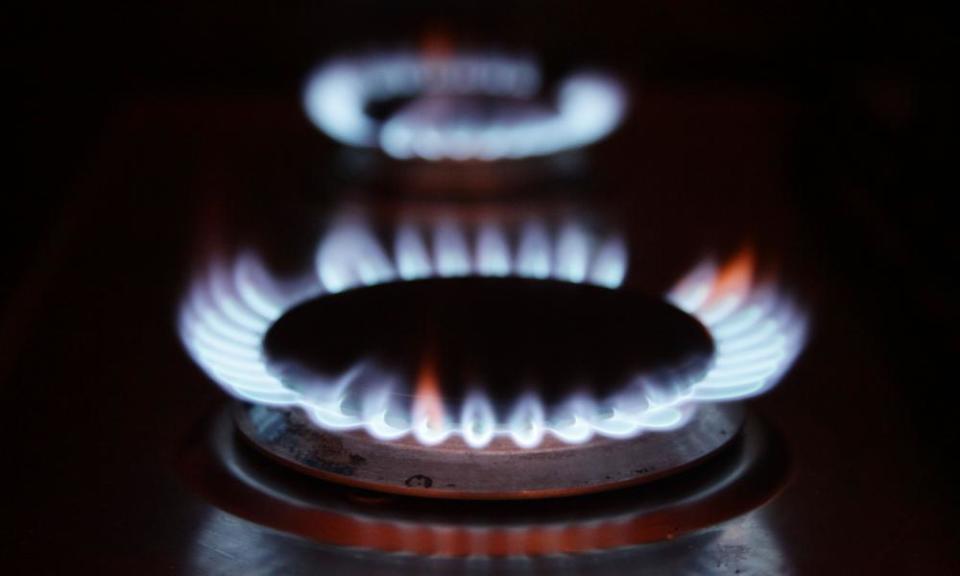Big energy firms lobby Theresa May to water down price cap pledge

Energy companies are lobbying the Conservative party to water down its policy of a price cap on bills, with proposals that would protect millions fewer UK households from tariff rises.
Theresa May has promised to cap electricity and gas costs for 17 million families on default energy deals, called standard variable tariffs, after five of the big six suppliers increased prices. But under a compromise that has been put to the government, only 6m households would have their energy bills capped.
Under the plan, an existing cap for 4m households on prepayment meters – mostly more vulnerable customers – would be extended to a further 2m homes that already receive a £140 discount on their electricity bills, the Warm Home Discount.
The proposal also envisages the government either setting targets for energy suppliers to shift people off standard variable tariffs, or scrapping them altogether in favour of an insurance-style product in which households would renew a contract with an energy supplier annually.
“If you did that, it’d be very hard to argue against it, wouldn’t it? Because you’re looking after those people who need it most,” said a senior industry source.
A Conservative MP strongly criticised any attempts to water down the flagship policy, and warned that weakening the cap would cost billpayers.
“This big six stitch-up will do nothing to protect the vast majority of consumers. The prime minister was absolutely right to propose an energy price cap that helps the 17 million of us who are on rip-off tariffs,“ said John Penrose, who has led calls for a relative price cap, where a company’s most expensive tariffs are capped in relation to its cheapest ones.
The Conservative manifesto last week did not specifically mention how many people would be protected by a cap, promising only to “extend the price protection currently in place for some vulnerable customers to more customers on the poorest value tariffs”.
The manifesto’s vague language was a sign the industry’s dialogue with government was bearing fruit, said an industry source. “It’s an indication they’ve been listening to all sides,” they said.
The Tories have denied the manifesto represented a weakening of the cap. “There has been absolutely no watering down or changes to our plans to cap energy prices and to suggest otherwise is simply wrong,” a Conservative spokesman said.
A source at one of the big six suppliers said that while the manifesto language was “softer” than May’s broadside against “rip-off” energy prices in the Sun newspaper, they were not celebrating, saying: “From our point of view, we’re definitely not cracking the champagne open.”
Analysts at asset management firm Bernstein said a price cap on 17m households would cost British Gas owner Centrica £150m a year.
The industry source defended the idea of a cap for 6m households as a compromise that would help consumers and preserve competition, which some big suppliers have warned could be a casualty of a wide-ranging ceiling.
“Then you’re starting to say you’ve got a market that’s working for everyone, because we’re protecting those who need it most. We’re giving encouragement to get more engagement and we’re protecting the competitive market, ie those who are already engaging,” the source said.
“And we’re therefore encouraging and helping new entrants [suppliers] put pressure on the incumbents to respond.”
Ovo, a challenger energy company that the regulator has dubbed one of the emerging “big eight” suppliers, criticised the lobbying.
“If the big six spent as much time trying to build innovative and customer-centric businesses as they do on trying to influence policy, we wouldn’t need energy price caps,” said Stephen Fitzpatrick, the company’s founder and chief executive.
The idea of extending the cap on prepayment meter customers to those on Warm Home Discount, and setting targets to get people off standard variable tariffs has been backed by Citizen’s Advice. But the consumer group called the plan the “least ambitious option” being considered by the Tories.
Any price cap is not expected to be imposed until April 2018 at the earliest.

 Yahoo Finance
Yahoo Finance 